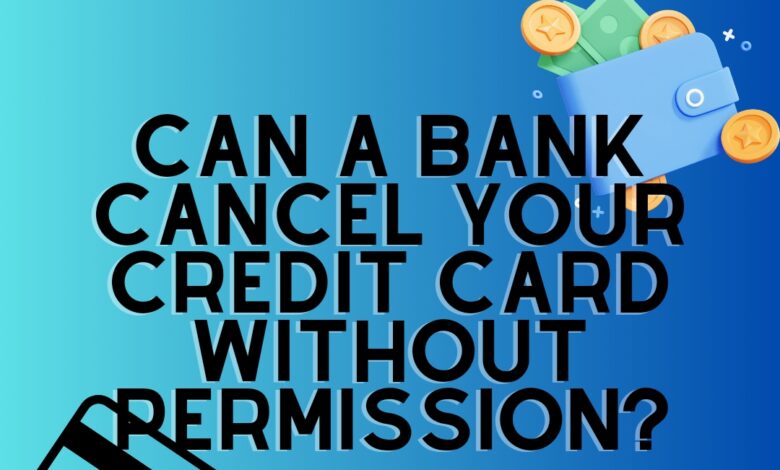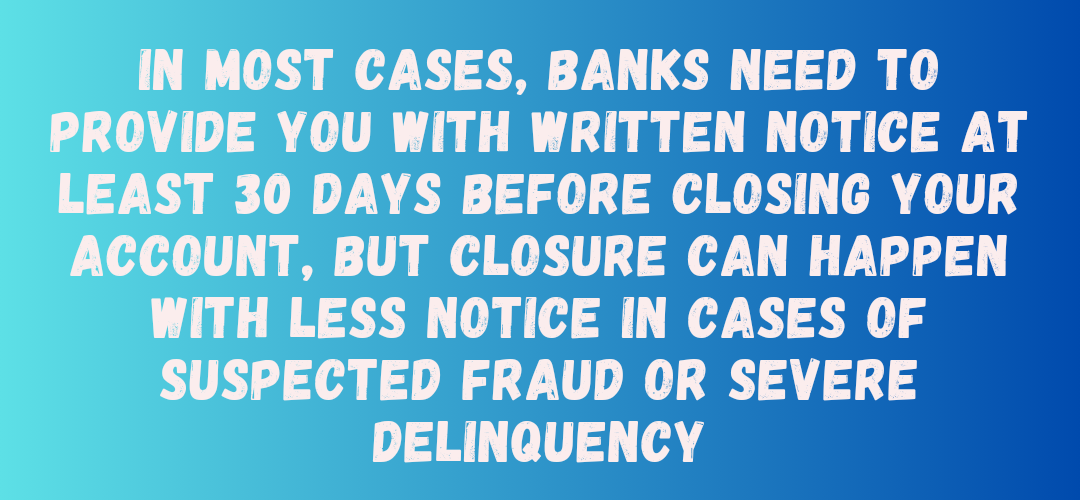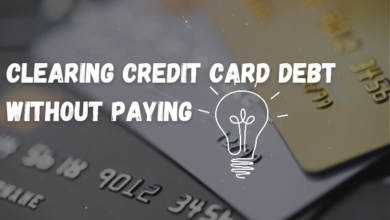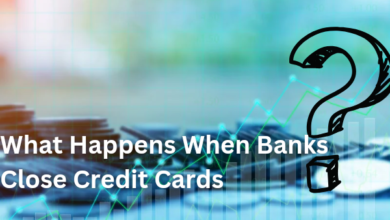Can a Bank Cancel Your Credit Card Without Permission?

After a long day at work while driving home that day I stopped by at the supermarket to shop for groceries.
I took time and patience to select everything we needed at home because I didn’t want to forget anything and of course I was also tired.
After checking for the 100th time and making sure I had picked everything, I walked to the cashier for payment, she packed up and it was then time for payment. I gave her my credit card and it declined. I urged her to try again but it was to no avail.
So I had to let go of everything I had picked, I was so pissed, wondering why the card could not go through, it was at my doorstep that day when it clicked that my bank had sent me a email some days ago bringing to my notice that they noticed suspicious activities about my account and I needed to clarify it.
I wasn’t able to go to the bank earlier because of work, but I wondered, does the bank have any right to close my credit card account without asking me ?
As a credit card holder, you probably expect to have access to your account as long as you make your payments on time. However, there are instances where a financial institution may close your card without getting your approval beforehand.
Table of Contents
When Can a Bank Cancel Your Card?
In as much as the situation is annoying, banks can legally close your credit card account without your permission under certain circumstances.
Here are some of the most common reasons you should look out for on why your bank might close your credit card account:
- If You Default on Payments.
When you fail to make your minimum monthly payments in a 90-day period, the bank can close your account for defaulting.
They are however required to notify you before closing your card due to non-payment.
Though, in severe cases of delinquency, they may shut down the account immediately even without notifying you.
- If You Violate the Cardholder Agreement
When you are about to open a credit card account, you have to agree to abide by the cardholder agreement terms.
And in the case of you breaking any major aspects of the agreement, such as by making illegal transactions, the bank can terminate your access to the funds and benefits of the card.
- If You Pose a Reputation Risk
If there’s one thing Banks want is to maintain a trustworthy public image. So If they find out that you engage in fraudulent activities with the card or use it in a way that could tarnish the bank’s reputation, they may decide to cancel your account even without prior notice.
This includes things like when you repeatedly dispute legitimate charges or allowing other people to use your card.
- If You Pose a Credit Risk
It is a normal routine for Financial institutions to regularly monitor their customers for risks.
So If in the case that your credit score drops significantly or you take on excessive debt compared to your income, the bank may decide you now pose too much of a default risk and thereafter close your account. We cannot blame them, can we?!
- If the Account Stays Inactive
When you open a credit card years ago and then sock it away without using it, Banks can close accounts that remain inactive for lengthy periods of time.
Often than not, closure for inactivity happens after 12 months without you making any purchase or payment.
Do Banks Have to Notify Me if They Cancel My Card?
We all would want to be notified of big decisions, and In most cases, banks need to provide you with written notice explaining why your account is being closed and when.
The notice is supposed to come to you at least 30 days before the account closure date so you have a chance to resolve the issue if it is possible.

As sweet as having a notice is, Sometimes account closure happens with less notice:
The banks are supposed to give you prior notice but account closure can occur without notice in the following circumstances.
- If there is suspicious activity suggesting fraud in your account
- If your account is severely delinquent
- If you break your cardholder agreement you had previously agreed to
To avoid the unexpected, Make sure your contact info with the bank is up to date so that you properly receive any notices sent about mandatory closures.
How Do I Know My Card Was Canceled?
When your card is canceled there are certain after effects it displays with or without prior notice.
Here are some signs to watch out for:
- Your Card Is Suddenly Declined
When You go to make a routine everyday purchase, you’ll find out that your card gets rejected at payment.
Honestly, it is very Embarrassing.
If your card starts getting frequently declined when you know your payment history is solid, an involuntary account closure may be the cause and you’ll have to visit the bank to sort out the issue.
- Your Credit Limit Disappears
When you Log in to your account and notice your available credit line reads $0, and you are unable to have access to your credit line like this signals your account was likely recently canceled.
- You Stop Accruing Rewards
Some of the benefits you get to enjoy in using credit cards are rewards points, cash back, or miles earned on purchases.
So If you observe that you abruptly stopped accumulating any rewards you previously collected, your account privileges may have potentially ended.
- You No Longer Get Monthly Statements
While using a credit card, you are expected to have access to your monthly credit card statements so if suddenly cease out of the blue, it is an indication that your account has been closed.
Some banks may however switch you to quarterly statements once your account gets closed and paid off.
It is imperative to Stay alert to these signals so you can respond swiftly if your card was revoked without notice.
How Do Account Closures Impact My Credit?
If your account shuts down without requesting it yourself , it can negatively impact your credit if you don’t handle it properly.
Here is how involuntary account closures show up on your credit report and scores:
- Closed Accounts Remain on Your Report
When an account closure happens, it continues appearing in your credit report file for up to 10 years. The closure itself may in fact lower your overall credit available and length of credit history, both the important scoring factors. And As long as you remain in good standing, the closure impact should be short-term.
- Defaults Severely Hurt Your Scores
If a bank closes your account due to non-payment, not only will the closure show on your report, but the bank may also hit you with a damaging derogatory mark for defaulting.
Defaulting trash talks about your credit reputation for up to 7 years unless you successfully negotiate a payoff.
- You Lose Account Longevity
Length of your credit history represents a chunk of your credit score calculation. So When an old card gets closed, you lose that historical account length which dings your scores. However, Opening new accounts helps you offset this impact.
As you can see, getting an account closed without your request or control can stir up some credit score trouble.
Make sure to engage with your bank always to prevent unwanted closures that severely trash your scores for years.
How to Prevent Involuntary Credit Card Account Closures
You’ll agree with me that getting your credit card closed is upsetting but While you cannot always prevent a bank from closing your accounts when policy violations occur, you can reduce the risk of surprise closures by through the following means:
- Paying Your Bill on Time Every Month
Delinquency triggers account termination, and sometimes with no notice. So you are advised to Set payment reminders and automate payments so you never miss dues.
- Using Your Card Occasionally
It is advisable to Make a small purchase or payment every 6-12 months so your card does not get marked inactive. Inactivity often leads to unwanted account suspension.
- Maintaining Good Credit Health Overall
You need to Keep your credit utilization low across all your cards, monitor your reports for errors, and keep your scores above 700 through smart credit behaviors. Banks see high scores as lower risk and so are less likely to cancel without cause.
- Calling Your Bank if You Suspect an Issue
When you receive a warning notification about potential account closure or suspect your card got compromised, call customer service.
When you Show a good faith to resolve problems, it may prevent the bank from abruptly shutting your account.
Conclusion
I believed we have done justice to the question whether Banks reserve the right to close credit card accounts at their discretion
They can ofcourse do that In certain situations according to the cardholder agreement. Defaulting on payments, engaging in account fraud, sinking credit scores, or lengthy inactivity however tend to trigger involuntary closures in many cases.
While unwanted account terminations will negatively impact your credit initially, no worries, responsible credit habits going forward can offset the longer term effects.
It is advisable to be a conscientious credit card holder by making payments on time, monitoring account changes closely, and maintaining productive communication with your financial institutions.
Taking these steps helps you secure and protect access to credit cards you depend on.



